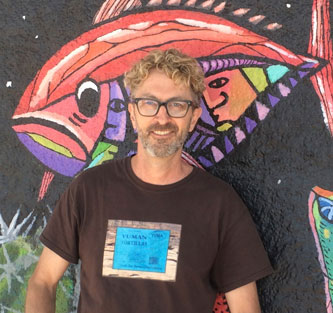Michael E. Hellberg
Associate Professor
Associate Chair, Graduate Studies
SEE Division
PhD: University of California, Davis, 1993
Phone: 225-578-1757
Lab Phone: 225-578-9114
Office: 107/328 Life Sciences Building
Lab: 330/334 Life Sciences Building
E-mail: mhellbe@lsu.edu
Hellberg Lab
Area of Interest
The study of speciation draws on nearly all facets of evolutionary research, from patterns revealed by paleontology and biogeography to genetic change at the population and molecular level. In my research, I apply a variety of genetic and genomic approaches to the study of marine invertebrates, whose life histories, mating strategies, and geographical distributions offer novel opportunities for understanding speciation.
Current projects in my lab use sequences for genes encoding rapidly evolving sperm and egg proteins to explore speciation mechanisms in marine snails and RADseq to infer population history and genes involved with ecological speciationin reef corals. Additional projects look at geographical and habitat changes to microbial symbionts associated with a corals and combine genomic and paleobiological data to ask how the protein matrix of the shells of bivalve mollusks have responded to changes in ocean acidity across geography and through time.
Selected Publications
Zarzyczny, K. M., M. E. Hellberg, E. B. Lugli, M. MacLean, D. A. Paz-García, M. Rius, E. G. Ross, E. X. Treviño Balandra, J. Vanstone, S. T. Williams and P. B. Fenberg. 2023. Opposing genetic patterns of range shifting temperate and tropical gastropods in an area undergoing tropicalisation. J. Biogeography.
Reigel, A. M. and M. E. Hellberg. 2023. Microbiome environmental shifts differ between two co-occurring octocoral hosts. Marine Ecology Progress Series 720: 59-83.
Reigel, A. M., D. A. Paz-García and M. E. Hellberg. 2021. Microbiome of a reef-building coral displays signs of acclimation to a stressful shallow hydrothermal vent habitat. Frontiers in Marine Science 8: 1223
Prada, C. and M. E. Hellberg. 2021. Speciation-by-depth on coral reefs: sympatric divergence with gene flow or cryptic transient isolation? Journal of Evolutionary Biology 34: 128-137.
Reigel, A. M., S. M. Owens and M. E. Hellberg. 2020. Reducing host DNA contamination in 16S rRNA surveys of anthozoan microbiomes using PNA clamps. Coral Reefs 39: 1817-1827.
Posbic Leydet, K., C. G. B. Grupstra, R. Coma, M. Ribes, M. E. Hellberg. 2018. Host targeted RAD Seq reveals genetic changes in the coral Oculina patagonica associated with range expansion along the Spanish Mediterranean coast Molecular Ecology 27: 2529-2543.
Hellberg, M.E., C. Prada, M. H. Tan, Z. H. Forsman and I. B. Baums. 2016. Getting a grip at the edge: recolonization and introgression in eastern Pacific Porites corals. J. Biogeography 43: 2147-2159.
Paz-García, D. A., M. E. Hellberg, F. J. García-de-León and E. F. Balart. 2015. Switch between morphospecies of Pocillopora corals. The American Naturalist 186: 434-440.
Prada, C. and M. E. Hellberg. 2014. Strong natural selection on juveniles maintains a narrow adult hybrid zone in a broadcast spawner. The American Naturalist 184: 702-713.